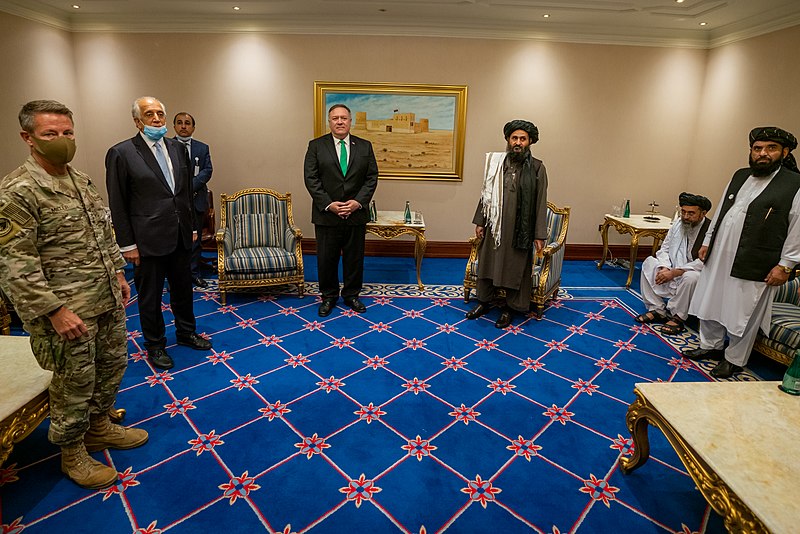Afghanistan and the whole world are now reeling from the aftermath of the military evacuation made by the US and its allies upon the resurfacing of the Taliban. As the insurgent group seeks to form its own government, the Taliban has also announced its interim officials.
The Taliban announced Tuesday that the UN-sanctioned Taliban veteran Mullah Mohammad Hassan Akhund is to be the leader of Afghanistan’s new Taliban-ruled government. Taliban spokesperson Zabihullah Mujahid announced at a press conference that the group’s co-founder, Abdul Ghani Baradar would be the deputy leader. The rest of the officials Mujahid named are still in an acting capacity.
“The cabinet is not complete, it is just acting,” said Mujahid during the press conference at the Government Information and Media Center in Kabul. “We will try to take people from other parts of the country.”
Mullah Yaqub was named as the acting defense minister. Yaqub is the son of the late Taliban founder and Supreme Leader Mullah Omar. Haqqani network leader Sirajuddin Haqqani was also named as acting interior minister and Amir Khan Muttaqi, who was involved in the negotiations in Doha, Qatar, was named the acting foreign minister.
The insurgent group has been expected to announce its government after a rapid takeover of Afghanistan in the heels of the evacuations of the US and other allies. The Taliban has also looked to show a more moderate mindset, pledging to have a more inclusive government. However, it appears unlikely that there would be women appointed into government positions.
As the Taliban rapidly took control of Afghanistan, in the midst of evacuations, Afghan President Ashraf Ghani was revealed to have fled the country. This week, Ghani released a statement apologizing to the public for fleeing as well as explaining why he had to leave.
Ghani said in the statement that he had no choice but to leave, as his security team had advised him that if he should remain, there would be clashes in the streets similar to what was seen in Kabul during the 1990s. Ghani said that it was the most difficult decision he had to make, but in order to avoid more bloodshed, he had to leave.
However, Ghani also noted that he ultimately was unable to bring peace and stability to Afghanistan like his predecessors.



 Israel Approves West Bank Measures Expanding Settler Land Access
Israel Approves West Bank Measures Expanding Settler Land Access  Trump Says “Very Good Talks” Underway on Russia-Ukraine War as Peace Efforts Continue
Trump Says “Very Good Talks” Underway on Russia-Ukraine War as Peace Efforts Continue  US Pushes Ukraine-Russia Peace Talks Before Summer Amid Escalating Attacks
US Pushes Ukraine-Russia Peace Talks Before Summer Amid Escalating Attacks  Trump Lifts 25% Tariff on Indian Goods in Strategic U.S.–India Trade and Energy Deal
Trump Lifts 25% Tariff on Indian Goods in Strategic U.S.–India Trade and Energy Deal  Nicaragua Ends Visa-Free Entry for Cubans, Disrupting Key Migration Route to the U.S.
Nicaragua Ends Visa-Free Entry for Cubans, Disrupting Key Migration Route to the U.S.  Trump Allows Commercial Fishing in Protected New England Waters
Trump Allows Commercial Fishing in Protected New England Waters  Ghislaine Maxwell to Invoke Fifth Amendment at House Oversight Committee Deposition
Ghislaine Maxwell to Invoke Fifth Amendment at House Oversight Committee Deposition  Trump Slams Super Bowl Halftime Show Featuring Bad Bunny
Trump Slams Super Bowl Halftime Show Featuring Bad Bunny  Japan’s Prime Minister Sanae Takaichi Secures Historic Election Win, Shaking Markets and Regional Politics
Japan’s Prime Minister Sanae Takaichi Secures Historic Election Win, Shaking Markets and Regional Politics  Netanyahu to Meet Trump in Washington as Iran Nuclear Talks Intensify
Netanyahu to Meet Trump in Washington as Iran Nuclear Talks Intensify  Trump Backs Nexstar–Tegna Merger Amid Shifting U.S. Media Landscape
Trump Backs Nexstar–Tegna Merger Amid Shifting U.S. Media Landscape  Trump Administration Appeals Court Order to Release Hudson Tunnel Project Funding
Trump Administration Appeals Court Order to Release Hudson Tunnel Project Funding  China Warns US Arms Sales to Taiwan Could Disrupt Trump’s Planned Visit
China Warns US Arms Sales to Taiwan Could Disrupt Trump’s Planned Visit  Trump’s Inflation Claims Clash With Voters’ Cost-of-Living Reality
Trump’s Inflation Claims Clash With Voters’ Cost-of-Living Reality  Trump Congratulates Japan’s First Female Prime Minister Sanae Takaichi After Historic Election Victory
Trump Congratulates Japan’s First Female Prime Minister Sanae Takaichi After Historic Election Victory  Anutin’s Bhumjaithai Party Wins Thai Election, Signals Shift Toward Political Stability
Anutin’s Bhumjaithai Party Wins Thai Election, Signals Shift Toward Political Stability 































